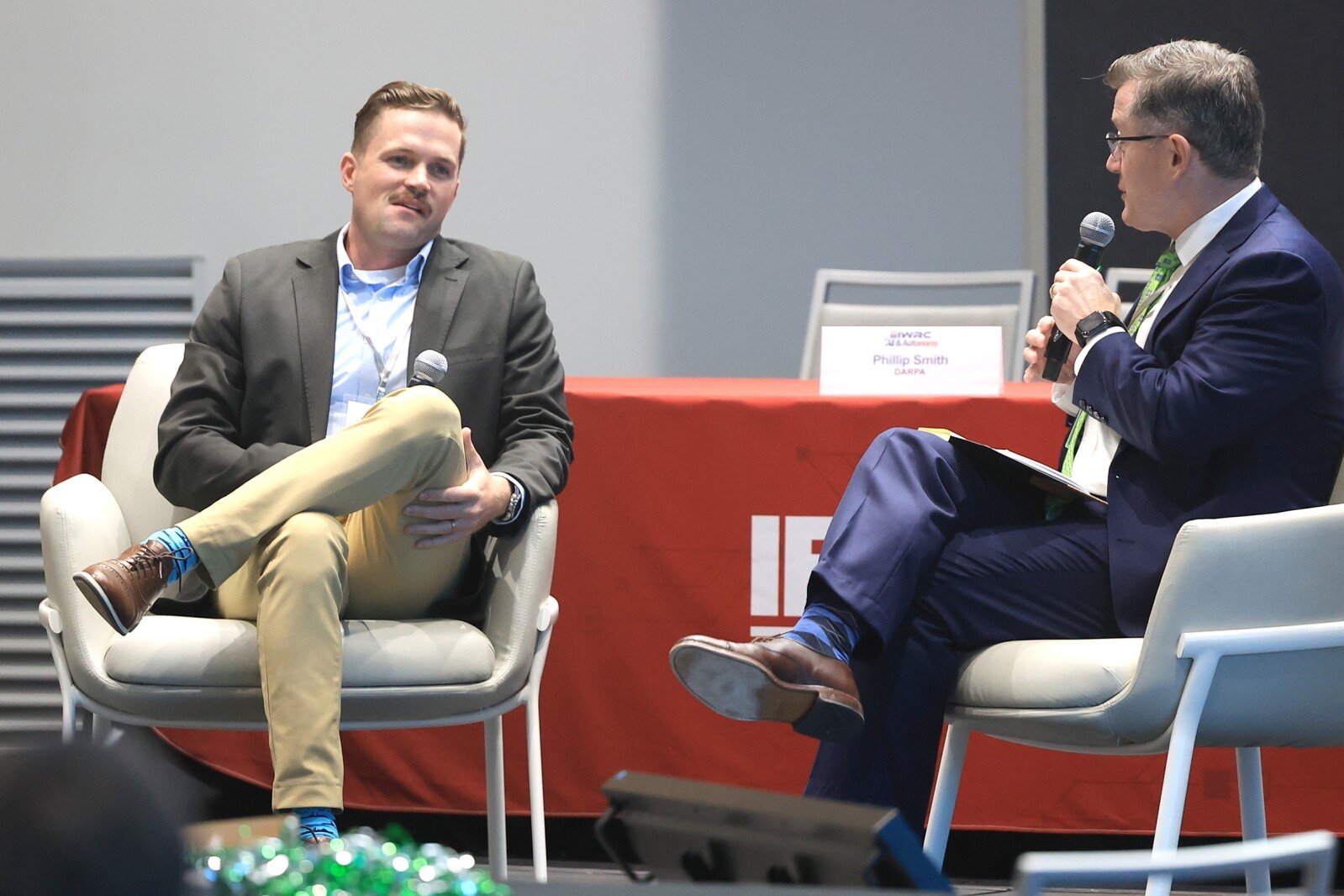Tools & Platforms
Can AI help Fort Worth realtors? One broker’s new company leans into the technology
It’s not unusual to see longtime commercial real estate broker Jordan Johnson with the latest gadget or testing the newest technology.
He has always been intrigued by entrepreneurship and technology throughout his 30-year career.
Aside from being an admitted fan of the latest and greatest, Johnson dove seriously into the entrepreneurial space.
He founded founded technology-focused companies such as eRealty.com, said to be the first brokerage to bring the multiple listing service or MLS database online; Xpressdocs.com, a firm that evolved from contract automation to high-end marketing collateral, serving major brands such as Coldwell Banker and Century 21; and LonestarGourmet.com, an online company focused on Texas cuisine that he later sold.
Along the way, Johnson, a fifth-generation Fort Worth native, has had a storied career as a commercial real estate broker. Early on, he began with the development of the Deep Ellum area in Dallas. He then transitioned into commercial retail, where he brokered several high-profile transactions, including the sale of riverfront property in his hometown to Pappas Restaurants.
“I’ve spent decades in brokerage and just as long early-adopting technologies that make work more efficient,” Johnson said.
No surprise then that Johnson couldn’t resist the growing marketplace for AI tools, particularly in exploring how artificial intelligence could be applied to the real estate brokerage space.
The result gave rise to Pecos Automations, a Fort Worth-based AI-driven automation platform he believes can revolutionize brokerage operations — and expand into other industries as well.
“After 30 years in commercial real estate, I know what true expertise looks like,” Johnson said. “With AI, expertise is accelerated. It shortens learning curves, compresses sales cycles and replaces busy work — so people can focus on what matters.”
Pecos Automations builds smart systems that automate lead generation, client communication and repetitive tasks so brokers can focus on deals, relationships and strategy, he explained.
“At small agencies, things can fall through the cracks,” he said. “AI can help a small agency keep up and offer some of the same services as a larger agency.”
To set up Pecos Automations, Johnson researched what technology was available and what tools made the most sense for the real estate community.
“I tried one after another and I finally arrived at building our own platform,” he said.
The platform is a combination of a handful of off-the-shelf technologies to achieve workflow automation for the clients.
“Those tools are just getting better, so we’ll update and change tools as that happens, so our customers are getting the latest,” he said.
Johnson, who is currently senior broker associate with Team & Vasseur Commercial Real Estate, used AI tools recently when he drove around two clients looking at properties in Weatherford.
Instead of doing what he and most other brokers would do — stop and take notes about the pros and cons of each — Johnson informed the clients he would record their conversations.
By the time they got back to their offices, Johnson delivered them a detailed report with bullet points on the sites visited, the clients needs and details about next steps in the process thanks to AI tools.
“We’re driving. It’s hard to take notes. You just can’t, so this just reinforces what we’ve talked about, and that’s the type of power these tools have,” he said.
Among the tools Pecos offers are AI-powered lead capture, automated follow-up workflows, customer relationship management, property marketing, instant text responses, revenue tracking dashboards, broker-client chatbots and marketing tools.
With his platform, AI can know everything about a property just by uploading a brochure to the program, Johnson said.
“So if someone calls, it can answer questions about square footage, all the basics, right away or they can be sent a brochure on a property,” he said. “I talk to people who are looking to buy property all the time and they’ll say, ‘I called the person about that property, and I haven’t heard back yet and it’s been two weeks.’ This would stop that kind of thing that really annoys clients.”
The current generation of AI tools are more accessible to smaller companies, not just large enterprises, enabling broader adoption and innovation, Johnson said.
“Smaller one- and two-person shops who previously had to wait on the price of new technologies to drop can take advantage of some of these tools at minimal cost,” he said.
Pecos Automations’ offerings will be priced based on the size of the real estate firm, Johnson said.
“We’re not a big company. We practice what we preach, and AI allows us to be more efficient as well, so it’s going to be extremely reasonable,” he said.
Johnson drew inspiration for the Pecos brand from West Texas and the Big Bend region to celebrate wide-open spaces and the freedom to work smarter from anywhere.
“The Pecos River is a metaphor,” Johnson said. “When done right, automation gives you space — space to be creative, present, human.”
While Pecos Automations is launching with a focus on commercial real estate, Johnson sees applications for the platform in other industries such as construction, roofing, health care, veterinary services, and food and beverage.
He suggests experimenting now with AI because the tools will only get more complicated in the next few years.
“Start easy and work your way up,” he said. “Things are changing quickly.”
Johnson is hardly alone in offering AI and technology tools to the real estate market.
According to a report from Fortune Business Insights, the global property technology market size was valued at $36.6 billion in 2024 and is projected to grow from $40.2 billion in 2025 to $88.4 billion by 2032.
Bob Francis is business editor for the Fort Worth Report. Contact him at bob.francis@fortworthreport.org.
At the Fort Worth Report, news decisions are made independently of our board members and financial supporters. Read more about our editorial independence policy here.
Related
Tools & Platforms
China Telecom Global Shines at the 10th Belt and Road Summit, Empowering the New Silk Road via AI for Good
HONG KONG, Sept. 10, 2025 /PRNewswire/ — From September 10 to 11, 2025, the 10th Belt and Road Summit was successfully held at the Hong Kong Convention and Exhibition Centre. China Telecom Global (CTG) participated prominently under the theme “Empowering the New Silk Road via AI for Good,” highlighting three core areas: the OneGrowth Global Partnership Initiative, AI global capabilities, and AI-driven applications. Through multiple benchmark cases, interactive scenarios, and physical displays, the exhibition systematically presented China Telecom’s cloud-network-intelligence-computing resource deployment and innovative AI applications along the Belt and Road, fully demonstrating its comprehensive strength and firm commitment to promoting regional collaborative development through digital technologies.
On the first day of the event, Ms. Wu Ting, AI Director of China Telecom Global, delivered a keynote speech titled “China Telecom Global: AI Blueprint and Capabilities”. She comprehensively presented CTG’s AI capabilities and architectural framework, highlighting a series of innovative achievements and practical applications in artificial intelligence. These included several cutting-edge AI products such as the OneTouch AI Engine, LLM Guardrail Platform, Enterprise No Code Agent Platform, and more, demonstrating CTG’s leading strength in artificial intelligence research and development and industrial application. Additionally, leveraging multiple demonstrated cases, she provided in-depth insights into CTG’s competitive advantages in building international digital infrastructure and delivering intelligent solutions for enterprises expanding globally.
At the summit, CTG featured a range of interactive highlights centered on its OneGrowth Global Partnership Initiative and global AI capabilities, comprehensively demonstrating its strength in AI+ technologies and ecosystem collaboration.
Empowering AI, Intergrow as One: Co-creating a New Digital Ecosystem
In the ” OneGrowth Global Cooperation Initiative” section, CTG highlighted its recently launched cooperation plan with a focus on three key ecological directions: AI+ Intelligent Empowerment, AI+ Comprehensive Mobile Global Cooperation, and AI+ Innovative Business, all guided by the four core principles of co-creation, sharing, co-governance, and win-win. The AI+ Intelligent Empowerment initiative is developing a global ecosystem computing power scheduling platform that integrates intelligent and general computing services while collaborating with partners to build scenario-based digital enablement platforms. The AI + Comprehensive Mobile Global Cooperation leverages a multidimensional mobile network covering “land-sea-air-space,” promoting cooperation in 5G, satellite communications, and Internet of Vehicles (IoV). Meanwhile, AI+ Innovative Business featured collaborations in visual network, exemplified by the transnational SeeLink Global Platform, which integrates AI algorithms, devices, cloud services, and applications to provide end-to-end solutions tailored to diverse customer needs.
Application in Action, Leadership in Intelligence, Interactive Demos Showcasing Technological Strength
In the “AI Global Capabilities” section, beyond showcasing its global digital infrastructure, the exhibit provided a clear overview of its resource network—including 53 submarine cables, 251 international PoPs (Points-of-Presence), and 15 overseas data centers. It also highlighted the capabilities and advantages of two major computing power engines: the AI data centers in Tseung Kwan O, Hong Kong, China and Jakarta, Indonesia. These demonstrate CTG’s core strength in reinforcing the foundation of the “Digital Silk Road” and supporting regional enterprises through digital transformation.
CTG prominently spotlighted its AI solutions and benchmark cases, including 5GC scenario applications and low-altitude economy service system. Through global applications such as supporting Chinese automotive companies expanding into Europe and assisting game developers in global operations, CTG demonstrated its deep practical achievements across Belt and Road markets. These cases underscore the company’ leading strength in driving industrial digital transformation and facilitating the global expansion of services.
Meanwhile, at the AI interactive experience and physical exhibition zone, CTG featured engaging activities such as AI-powered opera face-changing, a 5GC-enabled robotic dog, and the Tianshu drone. By seamlessly integrating traditional culture with cutting-edge artificial intelligence, CTG vividly demonstrated its innovative capabilities and technological expertise in cutting-edge fields such as 5G, AI, the Internet of Things, and the low-altitude economy. The interactive displays attracted extensive on-site participation and drew significant audience engagement.
During the summit, CTG engaged in on-site discussions with customers and partners from around the world to explore new opportunities within the Belt and Road digital economy. Moving forward, CTG will continue to leverage its strengths in cloud-network resources, AI technologies, and global services to provide efficient and reliable digital solutions for countries and regions along the route, further advancing the development of the “Digital Silk Road” to new heights.
Through its participation, CTG has fully demonstrated its capabilities as a world-class provider of digital-intelligent technology services in resource integration, technological innovation, and ecosystem influence. This exhibition underscored the company’s firm commitment to empowering high-quality development along the Belt and Road and co-creating a smart future through technological innovation.
SOURCE China Telecom Global

Tools & Platforms
OpenAI to Launch AI-Powered Jobs Platform — Campus Technology
OpenAI to Launch AI-Powered Jobs Platform
OpenAI announced it will launch an AI-powered hiring platform by mid-2026, directly competing with LinkedIn and Indeed in the professional networking and recruitment space. The company announced the initiative alongside an expanded certification program designed to verify AI skills for job seekers.
The OpenAI Jobs Platform will use artificial intelligence algorithms to match candidates with employers based on demonstrated AI competencies rather than traditional resume keywords. The platform targets businesses seeking workers proficient in automation, prompt engineering, and AI implementation across various industries.
OpenAI is collaborating with major employers, including Walmart and Boston Consulting Group, to develop the platform’s functionality. Walmart, the largest private employer in the United States with 1.6 million workers, will initially provide free certification access to all US employees.
The Texas Association of Business plans to use the platform to connect local employers with candidates capable of supporting IT modernization projects, according to OpenAI’s announcement.
The company is expanding its OpenAI Academy, a free learning platform that has reached over two million users, to offer formal AI certifications. The program will cover skills ranging from basic workplace AI applications to advanced prompt engineering techniques.
Training and certification testing will occur within ChatGPT’s Study Mode, allowing candidates to prepare and complete credentials without leaving the application. OpenAI aims to certify 10 million Americans by 2030.
The initiative positions OpenAI against established players in the professional networking market. LinkedIn maintains over one billion members globally, while Indeed processes 27 hires per minute with 615 million registered job seekers.
The platform also competes with LinkedIn Learning’s educational offerings, potentially creating tension with Microsoft, OpenAI’s primary investor, with a reported $13 billion stake. Microsoft has previously identified OpenAI as a competitor in specific business segments despite their partnership.
Labor market data support OpenAI’s focus on AI competencies. Research by Lightcast analyzing over one billion job postings found that positions requiring AI skills offer salaries averaging 28% higher than comparable roles without such requirements. Jobs demanding multiple AI skills command premiums up to 43% above standard compensation levels.
The demand spans industries as companies integrate artificial intelligence into operations for task automation, data analysis, and product development. Employers increasingly seek workers capable of practical AI application rather than advanced technical programming skills.
The platform will allow employers to describe requirements in natural language, with AI systems identifying candidates who demonstrate relevant capabilities through portfolio work and practical experience. This approach differs from traditional keyword-based matching systems used by existing job platforms.
OpenAI’s system aims to surface candidates based on actual project experience and demonstrated competencies rather than resume optimization techniques commonly used on current platforms, the company said.
About the Author
John K. Waters is the editor in chief of a number of Converge360.com sites, with a focus on high-end development, AI and future tech. He’s been writing about cutting-edge technologies and culture of Silicon Valley for more than two decades, and he’s written more than a dozen books. He also co-scripted the documentary film Silicon Valley: A 100 Year Renaissance, which aired on PBS. He can be reached at [email protected].
Tools & Platforms
Grand Forks believes in the future of AI and technology, Mayor Bochenski says at AI and Autonomy Summit – Grand Forks Herald

GRAND FORKS — Grand Forks believes in the future of artificial intelligence and technology and is working to grow in those areas, Mayor Brandon Bochenski told an audience brought together to discuss AI and autonomous systems in Grand Forks and the state.
“We’re standing on the great work that’s happened before us, and just trying to enhance it and make it better,” Bochenski said. “There’s 10, 20 years of work that goes into Grand Forks being put on the map. I’m just grateful that we’re on the map today.”
His sentiments were echoed by others attending the summit, one of the Innovation, Workforce and Research Conferences put on by IEEE-USA, a technical professional organization. The event was held Wednesday, Sept. 10, at the University of North Dakota Memorial Union. Between discussions on state innovation, education, workforce, networking and investing in AI and autonomy, leaders in the fields of AI and autonomy spoke to its presence at UND, Grand Forks and North Dakota as a whole.
Scott Snyder, vice president for research and economic development at UND, mirrored Bochenski’s statement on the decades of work put into the community. UND has been on the “absolute cutting edge of uncrewed and autonomous technologies and systems for well over two decades,” he said. The university also has multiple private and university partners, as well as partnerships with the Department of Defense, National Aeronautics and Space Administration (NASA), Department of Homeland Security, Federal Aviation Administration and other federal government entities.
“UND is at the center of one of the most vibrant environments for the development and deployment of autonomous systems around the world,” Snyder said.
An example of engagement between UND and the federal government was a discussion between UND President Andrew Armacost and Phillip Smith, the program manager for the Tactical Technology Office at DARPA (Defense Advanced Research Projects Agency).
Smith admitted he doesn’t like the word “autonomy,” as he believes it acts similarly to words like “cyber” and “synergy” as jargon people use but don’t actually understand. Breaking down the subsections of autonomy and informing people is important, he said. When Armacost asked Smith what his definition of autonomy is, he said, “software that people don’t understand.”
“It is just an algorithm that cannot be explained to people until we get to general AI,” Smith said. “Humans actually don’t understand what is happening. … Machines are supposed to be serving humans, and humans don’t even know what they want, so that’s a really hard thing.”
Smith said DARPA is working with GrandSky, testing drones that will be able to find a ship at sea, and then orient and land on it without human connection. GrandSky is an aviation business park west of Grand Forks that specifically focuses on the UAS industry.
“That’s the program that we have out here in North Dakota testing, and it’s been really fun,” he said.
Armacost said each person in the room has the opportunity to engage with DARPA, including industry partners, university partners and others.
“They have a large number of avenues that they use to cooperate with their work on technology development,” he said.
The summit itself was the product of UND leaders interacting with IEEE-USA and having an interest in showcasing what the region is doing. Mark Askelson, vice president for research-national security, said he was at a Sioux Falls, South Dakota, summit with Ryan Adams, the dean of engineering and mines, and spoke with some IEEE-USA staff about possibly holding an event in Grand Forks. Askelson said it’s an opportunity to show what the region is doing to more people who don’t know about it. It also is helping forge new connections.
“Despite the fact that we are nationally recognized, I would argue in some of these areas, there’s still a lot of people that don’t know about us,” he said. “They don’t understand some of the things that we do, so that is a great opportunity to bring those people here so they can see us. And, in my experience, once we can get somebody on the ground to see what we have going on, the light bulb goes on for them. That creates more opportunity for us to work with them and for us to innovate.”
-

 Business2 weeks ago
Business2 weeks agoThe Guardian view on Trump and the Fed: independence is no substitute for accountability | Editorial
-
Tools & Platforms4 weeks ago
Building Trust in Military AI Starts with Opening the Black Box – War on the Rocks
-

 Ethics & Policy2 months ago
Ethics & Policy2 months agoSDAIA Supports Saudi Arabia’s Leadership in Shaping Global AI Ethics, Policy, and Research – وكالة الأنباء السعودية
-

 Events & Conferences4 months ago
Events & Conferences4 months agoJourney to 1000 models: Scaling Instagram’s recommendation system
-

 Jobs & Careers2 months ago
Jobs & Careers2 months agoMumbai-based Perplexity Alternative Has 60k+ Users Without Funding
-

 Education2 months ago
Education2 months agoMacron says UK and France have duty to tackle illegal migration ‘with humanity, solidarity and firmness’ – UK politics live | Politics
-

 Education2 months ago
Education2 months agoVEX Robotics launches AI-powered classroom robotics system
-

 Podcasts & Talks2 months ago
Podcasts & Talks2 months agoHappy 4th of July! 🎆 Made with Veo 3 in Gemini
-

 Funding & Business2 months ago
Funding & Business2 months agoKayak and Expedia race to build AI travel agents that turn social posts into itineraries
-

 Podcasts & Talks2 months ago
Podcasts & Talks2 months agoOpenAI 🤝 @teamganassi



















